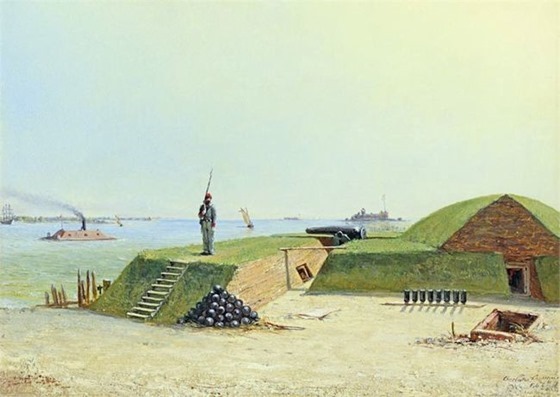Letter No. I.
On The Rapidan, May 20th, 1863.
My Precious Wife:
I am at last safely encamped with the Fourth Texas Regiment in a beautiful grove of chestnut on a hillside about one mile from Raccoon Ford on the Rapidan about seventy-five or eighty miles from Richmond, and must say that I feel better and happier and of a clearer conscience than since the war commenced.
We have no tents and few blankets, mine being lost, you know, and being replaced by a light one which Aunt Mary Stark gave me. The ground is hard but the weather is pleasant and water fine.
I did not believe I could feel so well satisfied so far from you, but, thank God, that I have a full and perfect faith on one point, viz: that whatever may await me, heaven will protect you and the children. I have not felt uneasy for a moment on that subject, and this morning I took out my Bible and opened it by chance and found the (104th) one hundred and fourth Psalm on the mighty power and providence of God. Can you not trust in such a power and enjoy yourself and feel satisfied? I do not want you to be sad a moment on my account.
I am perfectly well and have bacon, bread and a clear conscience. I have consummated the desire of my heart in connecting myself with this brigade. I intend to remain with it until it returns to Texas under a reign of peace, or I expect not to return at all. All of the Waco boys are well except Allen Killingsworth. I am afraid he is dangerously sick. He was in the hospital a month ago and came out too soon. He has a high fever and flux and is very weak this morning.
Billy Dunklin and all the rest are well. We have been encamped at this place for a week and may be ordered to move at any moment. I knew everything the brigade was doing when I was at home and on the way here, but am unable to find out anything about it now. We know less than anybody else. Tom Williams is the same old Tom. The whole brigade is in fine spirits, and it really does seem strange to see men who have lost so many friends seem so careless and happy. They sometimes talk almost like bullies at a street corner, except with a mild, calm air of determination and no swagger. The usual feeling seems to be, “We can’t be whipped, but we may all be killed.” I am satisfied that an imprudent leader could carry them to destruction. I met Tom Lipscomb yesterday on the cars. He is a major in Hampton’s Brigade, in Butler’s Regiment. Your brother, Lamar Stark, has been scouting in the enemies lines for more than six months. A few days ago he got into a fight; he was captured and Gillespie Thornwell was killed. Lamar is now a prisoner in the Old Capitol at Washington. Some of them have been enchanged already by lot, but Lamar was not drawn. He is well treated and will doubtless be exchanged soon. I learned this from Lipscomb, who got it from returned prisoners; so do not despond about him.
If you ever get my letter in which I make some suggestions about your coming to Columbia, you must let them be qualified by any change in the condition of our affairs in the West. Leave the servants by all means, all of them, and do not go more than $500.00 in debt. If you try it, write to me from Jackson, Mississippi. As soon as I get too sick to march or get wounded I will come to Columbia. You and Bro. Burleson, Mrs. Pearre, Miss Lambden, Dr. McDonald and Mrs. Carter must pray for me.
Your husband, faithfully ever,
John C. West.










